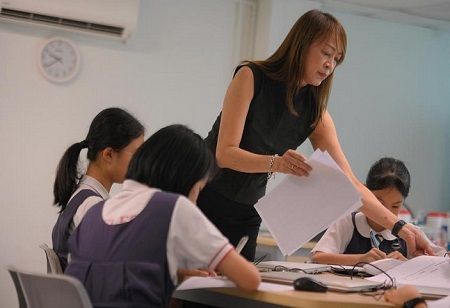After 40 years, the Gifted Education Programme (GEP), which has served the top 1 percent of primary school students, will be phased out in its current format and replaced with a new approach designed to reach a broader group of children. Prime Minister Lawrence Wong announced in his inaugural National Day Rally speech at ITE College Central that all primary schools will now be equipped to identify their high-ability students and implement programs tailored for them.
PM Wong said, “We will discontinue the current form of the GEP in primary schools. We will replace it with a new approach to stretch students with higher abilities across all our primary schools”. This will replace the current system, where Primary 3 pupils are selected from schools across the country for a centralised programme offered by nine primary schools, including Anglo-Chinese School (Primary) and Raffles Girls’ Primary School.
Under the updated programme, students will remain in their own primary schools, allowing them to stay with friends and teachers they have formed strong bonds with, according to PM Wong. Schools will have the capability to identify their own high-ability learners, thereby benefiting a larger number of students. Each primary school will develop its own programs to nurture these students' strengths and interests. Additionally, some students may have the opportunity for more advanced study in specific subjects beyond the school-based programmes.
PM Wong also mentioned that these students can gather for after-school enrichment modules at a nearby school, where they can learn and interact with peers. Education Minister Chan Chun Sing will provide further details in the future. The Gifted Education Programme (GEP), established in 1984, was designed to nurture students with higher abilities and help them reach their full potential. It addresses the needs of intellectually gifted pupils, who are identified through a two-stage process in Primary 3, with selected students invited to join the programme in Primary 4.
The GEP curriculum includes the same content areas as the mainstream curriculum but is extended in both breadth and depth. Students in the programme develop skills for independent inquiry and are encouraged to explore areas of personal interest. The programme originally began 40 years ago at Rosyth and Raffles Girls' primary schools, admitting students in Primary 4, and at Raffles Institution and Raffles Girls' School (Secondary), which admitted students in Secondary 1.
In 2004, the GEP for secondary schools was changed from a centralised programme to a system where schools conducted different programmes to benefit more high-ability students, he added, noting that this has worked well. For primary schools, however, Singapore continued to identify and pull pupils out for the GEP, placing them into nine primary schools. The move is an inclusive one that will help more children reach their full potential, said chairman of the Government Parliamentary Committee for Education Patrick Tay at the event.
Mr Tay, who is also the MP for Pioneer, said: “This review of the GEP means that whichever school you are in, you will have the support systems and mechanisms to be able to realise your passions so that no one is left out". He added that he has, over the past few years in Parliament, called for a serious review of the GEP and its relevance in the present day, given a countrywide shift to focusing on multiple pathways to success.
He said, “Compared with many years ago, when we were very focused on the traditional skills like mathematics and languages, nowadays we value multiple talents, multiple passions, and we want to help everyone realise their full potential”.

